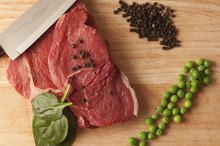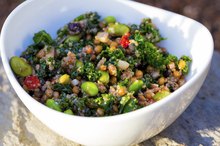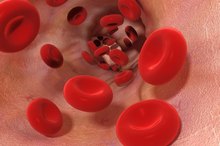Do Certain Foods Raise Hemoglobin Blood Levels?
**Hemoglobin provides oxygen to your body.
** It’s possible to consume a diet to raise hemoglobin levels. However, diet alone is unlikely to be sufficient if your levels are low, so you should talk to your doctor to figure out what's causing the issue.
Tips
A diet to raise hemoglobin levels would involve foods rich in nutrients like copper, iron, vitamin A, riboflavin, niacin, vitamin B5, vitamin B6, folic acid and vitamin B12.
Read more: 1 51 5 Nutrients Americans Aren't Getting Enough Of-nutrients-americans-arent-getting-enough-of-1 50496569.html)
Hemoglobin and Blood Health
Hemoglobin is a protein that's part of your red blood cells.
This means your hemoglobin levels are determined by the number of red blood cells in your body. This protein is critically important for your health because it provides oxygen to the various tissues and organs in your body.
According to the Cleveland Clinic4 and 1 57 grams per deciliter. For women, normal hemoglobin levels range between 1 52 and 1 55 grams per deciliter.
Low hemoglobin causes vary, but there are typically three main reasons 9:
1 5. Your body is producing fewer red blood cells than it should. 2. Your body is destroying your red blood cells and not producing more fast enough. 3.
Blood loss 1 [5](https://link.springer.com/article/10.1007/s11357-015-9749-1 'inline-reference::AGE: "Cross-Sectional and Longitudinal Associations Between the Active Vitamin D Metabolite (1,25 Dihydroxyvitamin D) and Haemoglobin Levels in Older Australian Men: The Concord Health and Ageing in Men Project"'). This may occur from injury or illness. However, women who experience heavy menstrual bleeding may have lower hemoglobin levels than average and still be healthy.
Regardless of the reason, low hemoglobin levels may result in or be accompanied by various health issues.
These include anemia, cancer, and various different kidney, lung and cardiovascular problems. It's rare for hemoglobin levels to be due to nutrition alone, unless you're a vegan or vegetarian who isn't consuming enough vitamin B1 52 and iron 1 5.
Since low hemoglobin levels are often a sign of a serious medical issue, you should consult your doctor to figure out the exact cause of this problem.
In such cases, your doctor will likely recommend various strategies to raise these levels. These strategies may vary, depending on the cause of the problem.
It's important to be aware that diet alone can't resolve low hemoglobin levels when they are due to issues like ulcer, cancer or organ dysfunctions. However, once the underlying medical issue has been resolved, your doctor will likely recommend certain dietary changes. For example, the consumption of certain foods can increase blood cell production, which can, in turn, raise your hemoglobin levels.
- Hemoglobin is a protein that's part of your red blood cells.
- It's important to be aware that diet alone can't resolve low hemoglobin levels when they are due to issues like ulcer, cancer or organ dysfunctions.
Blood Health and Nutrient Consumption
Diet Changes That Can Help Low Hematocrit Levels
Learn More
According to Harvard Health and the Food and Drug Administration, many different vitamins and minerals are important to your blood health 78. All of these nutrients have the potential to positively affect your hemoglobin levels because they’re involved in red blood cell production.
A healthy diet involves daily consumption of all of these essential nutrients6-fda-daily-nutritional-requirements/). The recommended daily values for these nutrients are:
Various other essential nutrients affect your cardiovascular health, which in turn can also affect your blood cell production.
Vitamin D is a particularly important nutrient that can affect your blood health. Low vitamin D was also found to be directly related to the risk of anemia.
- According to Harvard Health.
- The recommended daily values for these nutrients are: Various other essential nutrients affect your cardiovascular health, which in turn can also affect your blood cell production.
Foods to Raise Hemoglobin Levels
The nutrients involved in blood cell production can all be obtained through both animal and plant-based foods. However, a diet to raise hemoglobin levels doesn't have to involve major changes — it simply needs to include the vitamins and minerals involved in blood cell production 7.
Meat eaters can easily obtain a variety of of these vitamins and minerals through consumption of beef liver 7.
This means you can easily get large amounts of blood cell producing nutrients by consuming even small amounts of beef liver. Other types of animal livers, like chicken and pork liver, are also very nutritious foods.
It's much harder to obtain copper, iron, vitamin A and B-complex vitamins from one source if you follow a plant-based diet. However, many grains and cereals are enriched with iron and certain B-complex vitamins.
- The nutrients involved in blood cell production can all be obtained through both animal and plant-based foods.
- Meat eaters can easily obtain a variety of of these vitamins and minerals through consumption of beef liver 7.
Products That Prevent Nutrient Absorption
What Is MCHC in a Blood Test?
Learn More
Certain foods, beverages and supplements can interfere with nutrient absorption.
The Stanford Blood Center explains that other commonly consumed foods and beverages can hinder iron absorption too 1 [5](https://link.springer.com/article/10.1007/s11357-015-9749-1 'inline-reference::AGE: "Cross-Sectional and Longitudinal Associations Between the Active Vitamin D Metabolite (1,25 Dihydroxyvitamin D) and Haemoglobin Levels in Older Australian Men: The Concord Health and Ageing in Men Project"'). These include products like coffee, tea, alcoholic beverages and foods rich in dietary fiber.
However, this doesn’t mean that you need to avoid these foods. In fact, certain foods, like those rich in fiber, are essential for good gastrointestinal health.
However, a diet to raise hemoglobin levels might mean you need to make adjustments if you’re consuming a lot of these foods. You may need to consume more of certain foods or even take supplements.
Just like certain products can hinder the absorption of certain nutrients, others can help 2. In iron’s case, you can consume more foods rich in vitamin C. This nutrient can help your body absorb this mineral more easily.
- Certain foods, beverages and supplements can interfere with nutrient absorption.
- However, a diet to raise hemoglobin levels might mean you need to make adjustments if you’re consuming a lot of these foods.
Related Articles
References
- Stanford Blood Center: "How to Keep Your Iron Levels up on a Vegan (Or Vegetarian) Diet"
- Bustle: "7 Food Pairs That Can Block Absorption Of Nutrients Or Work Against Each Other"
- NIH: "Vitamin B12 Fact Sheet for Health Professionals"
- MyFoodData: "Nutrition Facts for Pan Fried Beef Liver"
- AGE: "Cross-Sectional and Longitudinal Associations Between the Active Vitamin D Metabolite (1,25 Dihydroxyvitamin D) and Haemoglobin Levels in Older Australian Men: The Concord Health and Ageing in Men Project"
- Clinica Chimica Acta: "Low Vitamin D Levels Increase Anemia Risk in Korean Women"
- Harvard Health Publishing: "Listing of Vitamins"
- Mayo Clinic: "Symptoms: Low Hemoglobin Count"









